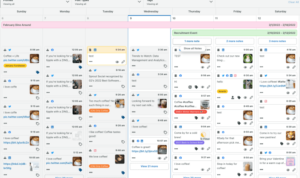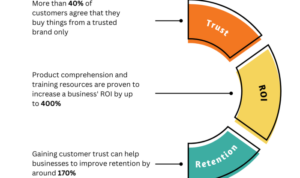Content Marketing for Small Businesses dives into the world of strategic marketing for small ventures, offering insight into how these businesses can thrive in the digital landscape. From defining content marketing to exploring successful strategies, this guide is your key to unlocking the potential of your small business.
Overview of Content Marketing for Small Businesses
Content marketing is a strategic approach that involves creating and distributing valuable, relevant, and consistent content to attract and retain a targeted audience. For small businesses, content marketing is crucial as it helps build brand awareness, establish credibility, and drive customer engagement. Unlike larger corporations with bigger budgets, small businesses often rely on creative and cost-effective strategies to reach their audience effectively.
Successful Content Marketing Strategies for Small Businesses
- Utilizing social media platforms to share engaging content and interact with customers in real-time.
- Creating informative blog posts or articles that address common pain points or questions of their target audience.
- Collaborating with influencers or partnering with other small businesses to expand their reach and credibility.
- Developing visually appealing and shareable content such as infographics, videos, or podcasts.
- Implementing email marketing campaigns to nurture leads and maintain customer relationships.
Benefits of Content Marketing for Small Businesses
Content marketing offers numerous advantages for small businesses looking to grow their online presence and attract more customers. By consistently creating and sharing valuable content, small businesses can effectively engage with their target audience and drive organic traffic to their website.
Building Brand Awareness
Content marketing plays a crucial role in helping small businesses build brand awareness. By creating high-quality and relevant content, businesses can establish themselves as industry experts and thought leaders. This not only helps in gaining the trust of potential customers but also increases brand recognition and visibility in the market.
- Creating informative blog posts, articles, and social media posts can help small businesses showcase their expertise and knowledge in their respective fields.
- Sharing engaging videos, infographics, and other visual content can attract more attention and increase brand recall among the audience.
- Consistent content creation and distribution can help small businesses stay top-of-mind with their target audience, leading to increased brand loyalty and customer retention.
Driving Organic Traffic and Increasing Sales
Content marketing is a powerful tool for small businesses to drive organic traffic to their website and ultimately increase sales. By optimizing content for search engines and sharing it across various online platforms, businesses can attract more visitors to their site and convert them into paying customers.
- Utilizing techniques in content creation can help small businesses rank higher in search engine results, leading to increased visibility and website traffic.
- Creating valuable and shareable content can help businesses reach a wider audience through social media sharing and word-of-mouth marketing.
- Including strong calls-to-action in content can prompt visitors to take desired actions, such as making a purchase or signing up for a newsletter, ultimately boosting sales and conversions.
Creating a Content Marketing Strategy for Small Businesses
Developing a content marketing strategy for small businesses is crucial for establishing a strong online presence and connecting with potential customers. By following these steps, you can create a tailored strategy that resonates with your target audience.
Identifying Target Audience and Creating Buyer Personas
To start, it’s essential to identify your target audience by understanding their demographics, interests, and pain points. Creating buyer personas can help you visualize your ideal customers and tailor your content to meet their needs effectively.
- Conduct market research to gather data on your target audience.
- Segment your audience based on common characteristics.
- Create detailed buyer personas that represent different segments of your target audience.
- Use insights from buyer personas to personalize your content and messaging.
Selecting the Right Content Channels
Choosing the right content channels is key to reaching your target audience and driving engagement. Consider the following tips when selecting content channels for your small business:
- Understand where your target audience spends their time online.
- Utilize social media platforms that align with your audience demographics.
- Create a company blog to showcase your expertise and provide valuable content to your audience.
- Explore email marketing as a direct communication channel with your customers.
Types of Content for Small Business Marketing

When it comes to marketing for small businesses, utilizing various types of content can help in reaching a wider audience and engaging potential customers. Different content formats have their strengths and can be effective in different ways. Let’s explore some of the most common types of content for small business marketing.
Blog Posts
- Blog posts are versatile and can cover a wide range of topics related to your business, products, or industry.
- They can help establish your business as an authority in the field and improve your website’s .
- Blog posts are great for providing valuable information to your audience and driving organic traffic to your site.
Videos
- Videos are highly engaging and can capture the attention of your audience quickly.
- They are perfect for showcasing products, sharing customer testimonials, and creating tutorials or behind-the-scenes content.
- Video content is easily shareable on social media platforms, increasing your reach and brand visibility.
Infographics
- Infographics are visually appealing and can present complex information in a simple and easy-to-understand format.
- They are perfect for sharing statistics, data, or step-by-step processes in a visually engaging way.
- Infographics are highly shareable on social media and can help drive traffic to your website.
Repurposing Content
Repurposing content involves taking existing content and adapting it into different formats to reach a wider audience. For example, you can turn a blog post into a video or create an infographic based on the key points of a blog post. By repurposing content, you can maximize reach and engagement, catering to different preferences and behavior of your target audience. This strategy can also help save time and resources while ensuring that your message is consistently delivered across various platforms.
Measuring Success in Small Business Content Marketing: Content Marketing For Small Businesses

When it comes to small business content marketing, tracking and measuring success is crucial to understanding the effectiveness of your efforts. By analyzing key metrics, small businesses can optimize their strategies and ensure they are reaching their target audience effectively.
Key Metrics to Track, Content Marketing for Small Businesses
- Website Traffic: Monitoring the number of visitors to your website can indicate the reach of your content and how well it is performing in attracting new leads.
- Engagement Metrics: Metrics like bounce rate, time on page, and social shares can provide insights into how engaging your content is for your audience.
- Conversion Rates: Tracking the percentage of visitors who take a desired action, such as signing up for a newsletter or making a purchase, can help determine the effectiveness of your content in driving conversions.
- ROI: Calculating the return on investment for your content marketing efforts can help measure the overall success and profitability of your campaigns.
Analyzing Data for Optimization
It’s essential to regularly analyze the data collected from your content marketing campaigns to identify patterns, trends, and areas for improvement.
By diving deep into the metrics and understanding what is working and what isn’t, small businesses can make data-driven decisions to optimize their content marketing strategies. This analysis can help in refining target audience personas, content types, distribution channels, and messaging to improve overall performance.
Importance of A/B Testing and Continuous Improvement
A/B testing involves creating two versions of a piece of content and testing them against each other to see which performs better. This method allows small businesses to experiment with different elements like headlines, images, or calls-to-action to determine what resonates best with their audience.
Continuous improvement is key in small business content marketing as it ensures that strategies are constantly evolving based on data and insights gained from previous campaigns. By testing, learning, and adapting, small businesses can stay ahead of the curve and continuously improve their content marketing efforts.












